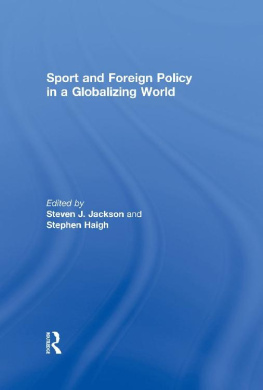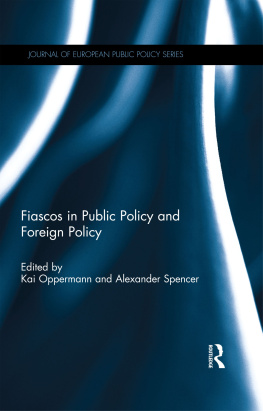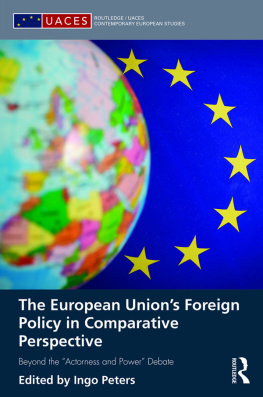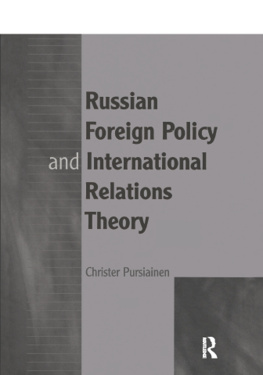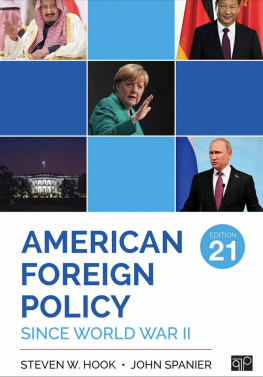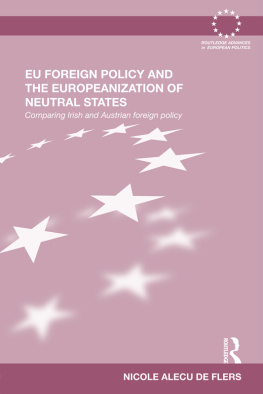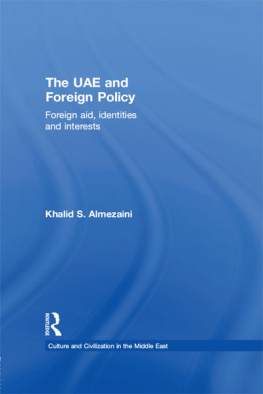Sport and Foreign Policy in a Globalizing World
Despite its strategic and enduring place within politics and international relations sport remains an ambiguous, intangible and conspicuously elusive part of contemporary foreign policy. However, in order to respond to novel social, political, cultural and economic pressures, states are increasingly turning to sport as a foreign policy instrument; and they cannot ignore the corresponding influence that global sport has on their core interests. Indeed, within the context of an increasingly interconnected world there is little doubt that the global spectacle, commodity and cultural phenomenon that is modern sport influences, and is influenced by, politics and foreign policy.
This book is devoted to exploring this relationship. Although any examination of sport and foreign policy inevitably focuses on issues related to both politics and international relations, the primary intention here is to consider the dimensions associated with foreign policy. Overall, the aim of this collection is to highlight the wide range of ways in which sport and foreign policy are converging within an increasingly globalized world. From a diversity of perspectives this book discusses, debates and reflects upon the role and significance of sport and foreign policy in a globalizing world.
This book was previously published as a special issue of Sport in Society.
Steven J. Jackson is a Professor at the School of Physical Education, University of Otago, New Zealand. He specialises in the socio-cultural analysis of sport with research interests in the areas of Globalisation, National Identity and Media. He is co-editor of Sport, Culture & Advertising, Sport Stars: The Politics of Sporting Celebrity, Sport in New Zealand Society, Sport, Beer, and Gender: Promotional Culture and Contemporary Social Life and Sport & Cultural Diversity in a Globalising World. He is the new President of the International Sociology of Sport Association (ISSA), 2008-2011.
Stephen Haigh obtained a PhD in International Relations from the University of Otago. He has spent five years working for the Canadian government, eventually becoming a policy analyst for the UN Convention on Biodiversity. Stephen is a keen sportsman, and has coached soccer at the international level.
Sport and Foreign Policy in a Globalizing World
Edited by
Steven J. Jackson and Stephen Haigh

First published 2009 by Routledge
2 Park Square, Milton Park, Abingdon, Oxon, OX14 4RN
Simultaneously published in the USA and Canada by Routledge
270 Madison Avenue, New York, NY 10016
Routledge is an imprint of the Taylor & Francis Group, an informa business
2009 Edited by Steven J. Jackson and Stephen Haigh
Typeset in Times 10/12pt by Alden Prepress Services, Northampton, UK
Printed and bound in Great Britain by MPG Books Ltd, Cornwall
All rights reserved. No part of this book may be reprinted or reproduced or utilised in any form or by any electronic, mechanical, or other means, now known or hereafter invented, including photocopying and recording, or in any information storage or retrieval system, without permission in writing from the publishers.
British Library Cataloguing in Publication Data
A catalogue record for this book is available from the British Library
ISBN 10: 0-415-44743-7
ISBN 13: 978-0-415-44743-0
CONTENTS
STEVEN J. JACKSON AND STEPHEN HAIGH
INGRID BEUTLER
BRUCE KIDD
PETER DONNELLY
JACQUES DEFRANCE AND JEAN MARC CHAMOT
WOLFRAM MANZENREITER
KRISTINE TOOHEY
JOSEPH MAGUIRE
DAVID F. GERRARD
DAVID BLACK
SCARLETT CORNELISSEN
ROBERT REDEKER
SPORT IN THE GLOBAL SOCIETY was launched in the late nineties. It now has over one hundred volumes. Until recently an odd myopia characterised academia with regard to sport. The global groves of academe remained essentially Cartesian in inclination. They favoured a mind/body dichotomy: thus the study of ideas was acceptable; the study of sport was not. All that has now changed. Sport is now incorporated, intelligently, within debate about inter alia ideologies, power, stratification, mobility and inequality. The reason is simple. In the modern world sport is everywhere: it is as ubiquitous as war. E.J. Hobsbawm, the Marxist historian, once called it the one of the most significant of the new manifestations of late nineteenth century Europe. Today it is one of the most significant manifestations of the twenty-first century world. Such is its power, politically, culturally, economically, spiritually and aesthetically, that sport beckons the academic more persuasively than ever to borrow, and refocus, an expression of the radical historian Peter Gay to explore its familiar terrain and to wrest new interpretations from its inexhaustible materials. As a subject for inquiry, it is replete, as he remarked of history, with profound questions unanswered and for that matter questions unasked.
Sport seduces the teeming global village; it is the new opiate of the masses; it is one of the great modern experiences; its attraction astonishes only the recluse; its appeal spans the globe. Without exaggeration, sport is a mirror in which nations, communities, men and women now see themselves. That reflection is sometimes bright, sometimes dark, sometimes distorted, sometimes magnified. This metaphorical mirror is a source of mass exhilaration and depression, security and insecurity, pride and humiliation, bonding and alienation. Sport, for many, has replaced religion as a source of emotional catharsis and spiritual passion, and for many, since it is among the earliest of memorable childhood experiences, it infiltrates memory, shapes enthusiasms, serves fantasies. To co-opt Gay again: it blends memory and desire.
Sport, in addition, can be a lens through which to scrutinise major themes in the political and social sciences: democracy and despotism and the great associated movements of socialism, fascism, communism and capitalism as well as political cohesion and confrontation, social reform and social stability.
The story of modern sport is the story of the modern world in microcosm; a modern global tapestry permanently being woven. Furthermore, nationalist and imperialist, philosopher and politician, radical and conservative have all sought in sport a manifestation of national identity, status and superiority.
Finally, for countless millions sport is the personal pursuit of ambition, assertion, wellbeing and enjoyment.
For all the above reasons, sport demands the attention of the academic. Sport in the Global Society is a response.
J.A. Mangan, Boria Majumdar and Mark Dyreson Series Editors
Sport in the Global Society
Sport in the Global Society
Series Editors: J.A. Mangan, Boria Majumdar and Mark Dyreson
Sport and Foreign Policy in a Globalizing World
Sport in the Global Society
Series Editors: J.A. Mangan, Boria Majumdar and Mark Dyreson
As Robert Hands in The Times recently observed the growth of sports studies in recent years has been considerable. This unique series with over one hundred volumes in the last decade has played its part. Politically, culturally, emotionally and aesthetically, sport is a major force in the modern world. Its impact will grow as the world embraces ever more tightly the contemporary secular trinity: the English language, technology and sport. Sport in the Global Society will continue to record sports phenomenal progress across the world stage.
Africa, Football and FIFA
Politics, Colonialism and Resistance
Next page
